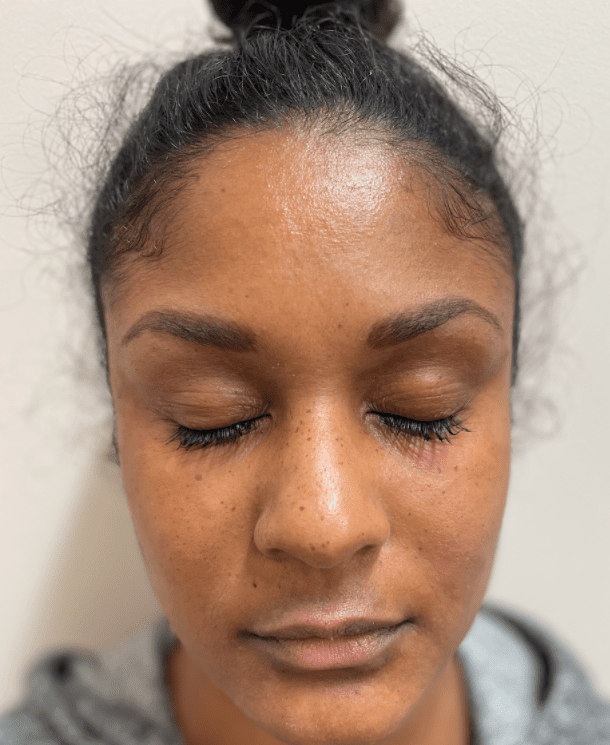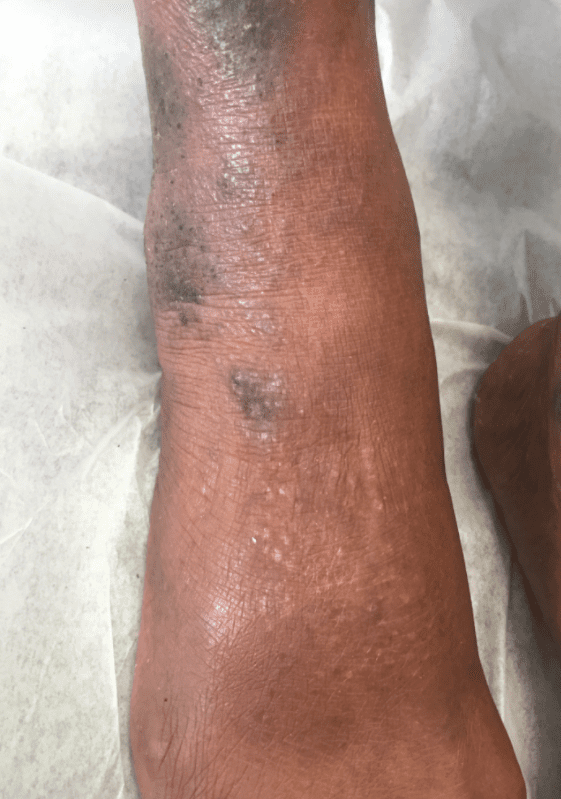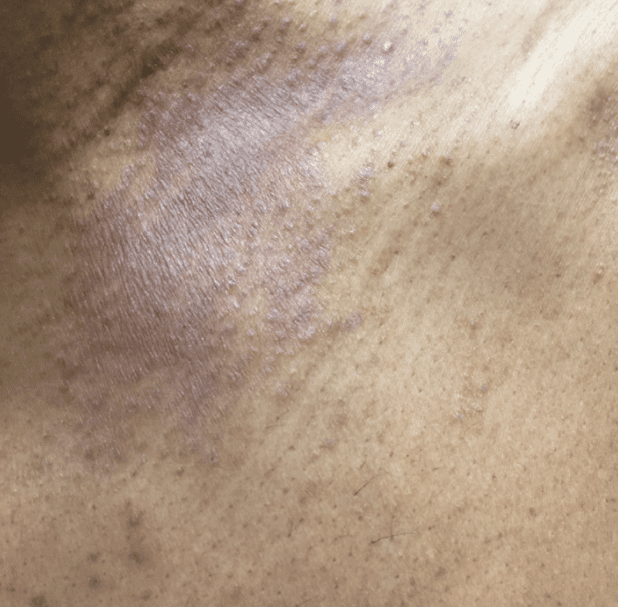While those of us in the Black community often (and sometimes jokingly) refer to patches of dry, flaky skin as "ash," there are some skin conditions that can't simply be alleviated by slathering on your go-to body lotion.
Eczema, also known as atopic dermatitis, for example, typically needs to be treated with a specialized ointment or steroid creams and can actually be exacerbated by fragrance as well as other common ingredients found in some skincare products. Oftentimes, Black people unknowingly suffer from the disease for years due to lack of awareness, representation, and education — despite the fact that it's the second most common skin condition the Black community faces.
"Access to a dermatologist with experience in treating skin of color can be challenging, which leaves the initial management of eczema to primary care, ER, and urgent care providers," Boston-based dermatologist Dr. Uchenna R. Okereke explains. "With so many other medical issues to manage, appropriate counseling for eczema may not be a priority."
And unfortunately, Dr. Okereke encounters this dilemma more often than not.
"I've had patients in my practice who have dealt with eczema their entire life but report that no one explained to them that eczema is a chronic condition and that adherence to a good skincare regimen is critical to keeping their condition under control," she shares. "I've had patients say to me, 'I wish someone told me this before.'"
Although access to proper dermatological care may still be out of reach for many in the Black community, we spoke with Dr. Okereke to help create a guide on what to look out for if you suspect you may have eczema, and how to treat it at home.
What Does Eczema Look Like on Black Skin?
Since Black people come in an array of shades, the appearance of eczema can vary based on skin tone. However, there are some tell-tale signs that the condition is present.
"Eczema on Black skin presents itself as ashen grey, purple or violaceous, red-brown or dark brown," Dr. Okereke explains. "On adults, it can present itself on the inner or outer arms, crux of the elbow, neck, eyelids, and hands to name a few. On infants, it may appear on the cheeks, neck, and hands."
The MD adds that while most commonly, eczema is thought to show up as patches of dryness, it can pop up in other forms as well. "It can appear as little bumps, papules, thickened plaques, lichenoids, or what we call a follicular presentation, and this presentation is more common in persons with darker skin tones," she says.
Why Are Black People So Prone To the Disease?
It's difficult to pinpoint the exact reason, but Dr. Okereke believes that it has to do with darker skin naturally being more prone to dryness.
"I think ceramides play a large role here," she explains. "Ceramides are fat-derived structures in the skin that help create a barrier to lock in moisture in the skin therefore preventing dryness and irritation. Darker skin tones have lower ceramide levels, thus leaving us with drier skin that is more susceptible to environmental triggers, such as pollutants that can ultimately cause eczema."
That said, regardless whether you've been diagnosed with eczema or not, using a daily lotion rich in ceramides is key to keeping the skin balanced.
We're fans of CeraVe Moisturizing Cream, which includes three essential ceramides, as well as hyaluronic acid in the tried-and-true formula.
Related Items
CeraVe Moisturizing Cream
VIDEO: How to Fade the Appearance of Stretch Marks
Can Eczema Trigger Post-Inflammatory Hyperpigmentation (aka Dark Spots)?
The long and short answer is yes.
Seeing as Black people are already more prone to hyperpigmentation, leaving eczema untreated can lead to a worsening of dark spots. But the way to remedy this issue is to begin to treat the skin as soon as a flare-up starts.
"Oftentimes, the hyperpigmentation is more psychologically disturbing to the patient than the eczema flare," explains Dr. Okereke. "It can last several months, even years. Topicals that we utilize to treat hyperpigmentation such as hydroquinone can potentially irritate the skin, therefore a thoughtful plan is required to effectively manage both conditions without precipitating a flare."
That said, if you're dealing with both conditions at once, go for products with gentle, moisturizing ingredients like vitamin E that will tackle both issues at once — without causing further irritation.
What Other Products Should I Keep Handy to Treat My Eczema?
According to the MD, less is more. Especially when it comes to factors like fragrance.
"I utilize a combination approach in treating eczema which consists of medicated topical emollients, thick moisturizers, free and clear detergents, and gentle cleansers, such as Dove Irritation Care Body Wash," she shares. "It's a fragrance-free body wash that cleanses and nourishes the skin with a thick, extra moisturizing lather that your skin will absolutely love."
However, for more severe cases, an oral or injectable medication may be needed.
Also, while Dr. Okereke shares that it's rare for food to trigger eczema, if you suspect your diet may be the cause, be sure to reach out to an allergist as soon as possible.
Source: Read Full Article






